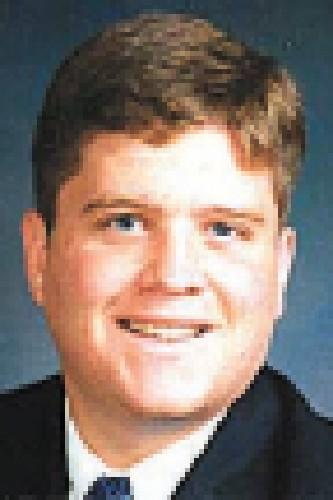New search for Peace Corps volunteer
Last Updated: 10/06/2007 07:00:43 AM EDT - Lowell Sun
By Jack Minch, jminch@lowellsun.com
LOWELL -- The U.S. Armed Forces Institute of Pathology in Dover, Del., is examining bones and clothing discovered last month during the most extensive search yet for Lowell Peace Corps volunteer Walter Poirier III. Poirier disappeared in the Zongo Valley of Bolivia's Andes Mountains in early 2001. The institute is expected to release results of its study next week, a spokeswoman for the Peace Corps said yesterday. The Peace Corps hasn't ruled out the possibility the bones are Poirier's, but others are doubtful. "They did find some bones, they did find some clothing materials, but none of them were Walter Poirier's," Dan Pontbriand, the chief of emergency services for the National Park Service, said from his office in Washington, D.C. |
 Walter Poirier ... missing since February 2001 |
Pontbriand didn't say why he doesn't believe the bones are Poirier's, but said he doesn't know whether they're human or animal.
Poirier, a 1996 graduate of Lowell High School, was last seen leaving a remote village of the Zongo Valley on Feb. 3, 2001, according to the Peace Corps. He's the only Peace Corps volunteer reported missing and never found.
The six-year-old probe into Poirier's disappearance appeared stalled until the Peace Corps reinvigorated its search efforts and sent an advance team to Bolivia early this year to prepare for last month's expedition.
U.S. Sen. Chris Dodd, D-Conn., a former Peace Corps volunteer, stepped in to ensure cooperation from the U.S. Embassy in Bolivia, which had had a strained relationship with the Peace Corps earlier in the investigation.
Then, last month, Peace Corps Inspector General David Kotz led a 27-person expedition, including four members of his staff, eight search and rescue specialists from the U.S. National Park Service, two FBI agents and four handlers with cadaver-sniffing dogs.
The Poirier family didn't travel with the expedition, but Kotz visited them before the trip.
"They gave us a detailed outline of what they were going to do and hope to accomplish," said Poirier's father, Walter Poirier. "And they had to take DNA samples."
Investigators believe Poirier attended a community meeting in the small village of Coscapa, about 11,500 feet above sea level, on Feb. 3, 2001. Then, against the advice of villagers, Poirier left in a heavy rainstorm headed toward the village of Liaullini, where there was a schoolhouse in which he kept a sleeping bag.
There are numerous hydroelectric plants in the region and Poirier followed an aqueduct trail fed by drainage that would have had significant run-off about the time he was hiking it, according to a narrative prepared by the park service.
Neither Kotz nor Peace Corps Special Agent Julie DeMello, who served as the incident commander, were available for comment yesterday.
The search team arrived in Bolivia Sept. 10 and, after a few days acclimating to the altitude, spent six days searching a 5-kilometer stretch of trail that, based on terrain, hazards and weather conditions at the time that Poirier disappeared, was determined to be the most likely place he fell, slipped or was washed off the aqueduct trail.
The search team worked through extreme conditions in terrain so steep at points that members were forced to rappel alongside waterfalls and use machetes to cut through the underbrush.
Despite the bones that searchers discovered, it's now believed Poirier's remains are buried under debris flows or were washed out of the search area, according to the park service.
Walter Poirier accepts that it was probably already too late to save his son by the time his wife Sheila Poirier contacted the Peace Corps to report him missing in March 4, 2001, but the immediate response by government officials afterward has been harder to stomach.
Kotz's expedition was a move toward making amends.
"I realize this is probably the last thing that will be done," Walter Poirier said. "After six years, there's realistically nothing more that can be done. At least at this point and time, I can speak for the family, it was important and it was nice to see somebody step up to the plate and do this."
Poirier joined the Peace Corps after graduating from the University of Notre Dame and was sent to Bolivia in late December 2000, where he worked alone with villagers in the Andes Mountains.
His last contact with his family was through an e-mail on Jan. 31, 2001. Neither the Peace Corps nor his relatives heard from him again.
Officials at the Peace Corps didn't even know he was missing until Sheila Poirier reported the family had lost contact.
The General Accounting Office, the nonpartisan investigative arm of Congress, placed blame for Poirier's disappearance on the Peace Corps, faulting it for not knowing he was missing until his mother reported she had lost contact. The GAO found that volunteers such as Poirier were often put in unfamiliar and dangerous countries with little or no direction or protection.
There were various leads into his disappearance, but there have been questions over whether the Peace Corps investigator pursued them vigorously. One lead indicated Poirier may have been killed over a debt . A second reported he'd been buried in a mountain pass.
Under pressure from Massachusetts' federal legislators, the Peace Corps hired an independent investigator in June 2004, but that didn't appear to help the investigation.